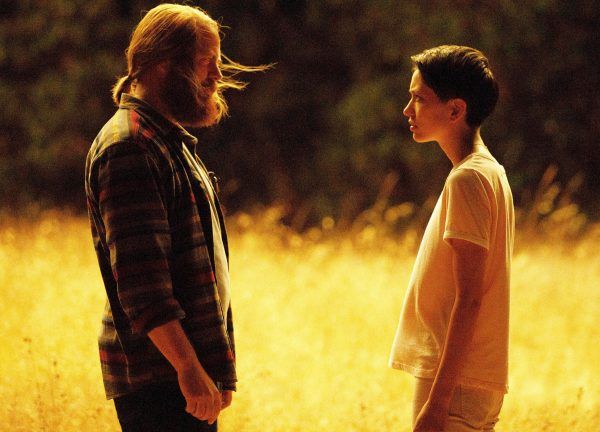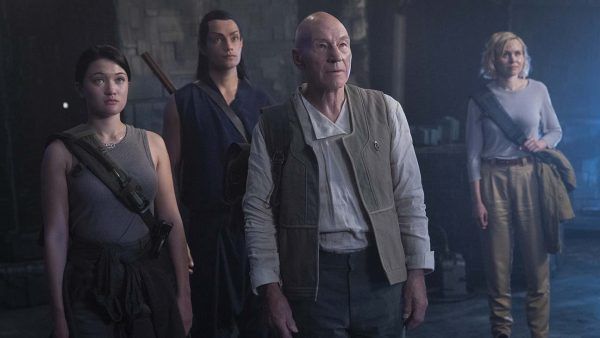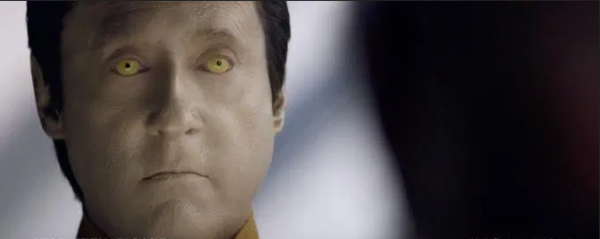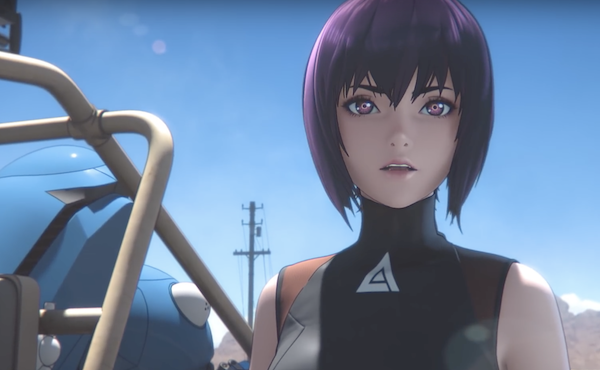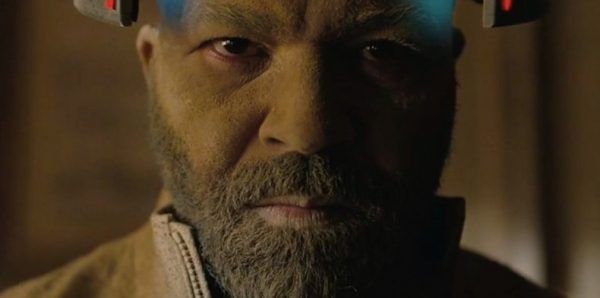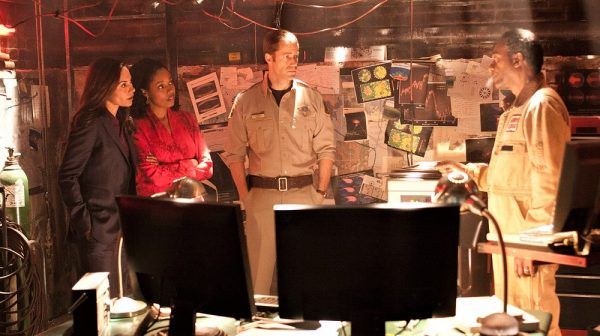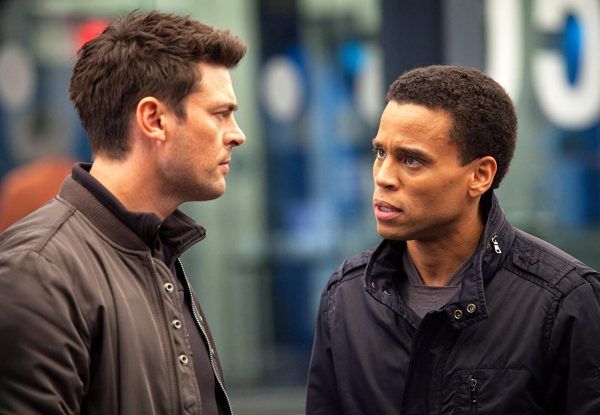Take a moment and think about a movie or TV show in which artificial intelligence poses a grave threat to humanity. Didn't take long for a title to spring to mind, did it? Terminator, I Robot, 2001: A Space Odyssey, Blade Runner, Star Trek, WarGames ... the list goes on.
Now, take a moment and think about a movie or TV show in which artificial intelligence works in concert with mankind for a better tomorrow. Go ahead, take another moment. Not as easy this time, is it? For some reason, we seem obsessed with a dystopian view of artificial intelligence and the dangers it poses to our way of existence rather than the utopian version of mankind and its software-based creations working together in lockstep for the betterment of all. Why do we choose to experience stories of conflict over cooperation? A psychologist could make a career out of that very question, but for movie and TV writers, the answer is less important. What's important is the fact that audiences seem to tune in for the dystopia, so they'll keep delivering. But as our fictional fantasies hew closer and closer to reality (or vice versa), these types of stories shift from a form of escapism to a downright bummer to experience.
In the first half of 2020 alone, TV has embraced A.I. in a big way, bringing big ideas to the small screen. But they're almost entirely dystopian. Devs, Altered Carbon, Star Trek: Picard, Ghost in the Shell: SAC_2045, and Westworld all tackle artificial intelligence (with varying degrees of intensity, philosophy, and execution); major spoilers for all of those series follow below. Some of these stories posit a highly advanced A.I. that's then put to use on a ridiculous task, others see their machine creations committing the same sins as man; all of them show a disturbingly dark turn toward the dystopian and nihilistic. Honestly, it's all been done before. So when the gunfire quiets and the philosophy fades, all we're left with is a familiar story of the dangers we pose to each other, told through the lens of artificially intelligent beings. What we need, however, is something more positive, stories that inspire and encourage and explore.
What we need in the television landscape is an A.I. revolution.
Devs
Perhaps the best of the bunch of "A.I. on TV" in 2020 is Alex Garland's FX on Hulu series Devs, a heavily philosophical show that ponders the existence (or not) of free will as opposed to predetermined destinies "on rails." The plot centers on the title machine-learning program--Devs or Deus, as it's revealed--housed in an elite tech company that has cornered the market on quantum computers. And yes, while the series is also chock full of espionage, violence, murder, and even a highspeed car chase sequence, the heart of it is in the philosophical question posed above: Are we in control of our own destiny, and if not, does anything even matter?
As you might have guessed, that's where Devs starts to turn dark, dystopian, and nihilistic. Ultimately the story saves itself from going full-tilt into this way of thinking; it actually uses A.I. to "resurrect" our lead characters in a fully simulated world (one of the infinite possible worlds) of their choosing. So even though some of the characters' other lives will experience "Hell on Earth" in the various other worlds, the ones we follow get to experience a sort of Heaven. That narrative choice gives Devs a veneer of optimism, but the premise set forth in the beginning could have done so, so much more.
The Devs program allows the techs to glimpse any moment in human history, from the distant past to the near future. Think about the possibilities for a second. Really think about what it would be like to have a window onto all of existence. Anthropologists, archaeologists, evolutionary biologists, historians, climate scientists, military strategists, cosmologists, religious leaders ... the list goes on ... researchers from every branch would absolutely kill for a chance like this. Kids all over the world--and most adults, too--would love a chance to peek through a window at living, breathing, moving dinosaurs from the safety of their living room couches. The opportunities afforded by a machine that lets us glimpse any moment in the history of the universe ... they're limitless. But what does Devs use it for? To appease the curiosity of the tech company's founder and, hopefully, assuage his guilt. As a personal journey toward redemption, it's great; as a tech-centered story of the possibilities of artificial intelligence, it's a tragic waste of imagination. And this show was one of the best 2020 had to offer! So hold on; it gets worse from here.
Star Trek: Picard
For as incredible as Star Trek has been in its exploration of artificial intelligence, historically speaking, Star Trek: Picard is a woeful step backwards. If Star Trek: The Next Generation's Data was the pinnacle of A.I. in the franchise, with a shoutout to the Borg for showing us the darker side of cyborg life, the famous android's legacy as it's seen in Picard is its nadir (though it could always get worse in Season 2). Data has long been an A.I. icon as not just the nexus between human ingenuity and artificial intelligence approaching sentience, the character is also a fantastic vessel for exploring what it means to be human. TNG took every opportunity to humanize Data; Picard bizarrely took every opportunity to undermine his story.
While much of the plot of Picard focuses on the title captain admiral, now retired, the subplot has a lot more to do with artificial intelligence ... and I use that term loosely. Picard is drawn back into duty when an android damsel in peril is assassinated in front of him in violent fashion, just when her mysterious origin story was starting to get interesting. But never fear, because all androids in this universe come in pairs, an idea that harkens back to the original series. It does not, however, hold for Data and his "evil", amoral older brother Lore, whose existence would 100% have made sense in this series to explain the genocidal race of androids who pop up late in the first season, but the writers opted not to go that route.
Instead, what we get is a civilization of android twins who are now hellbent on summoning ancient, powerful, and rather tropey-looking alien robot beings. Luckily they fail in this endeavor and all we're left with is a peek at gnarly robot claws fading away beyond a closing space portal, but yeesh, what a choice. It's unimaginative enough to have the sentient androids artificially descended from Data now acting like warmongering primitive humans instead of cold, calculating quantum-computing super-brains, but it's worse yet what Picard does to its title hero.
Diagnosed with an inoperable brain abnormality, Picard "dies" but is resurrected in an artificial body ... because the android civilization has the technology to download human consciousness into an artificial quantum computer nexus, generate a new body (which hilariously matches the rather frail, old, and inevitably dying specifications of the biological one), and even bring the two together with no rehab window to speak of, but they couldn't operate on this supposed brain abnormality? Okay. At least give the man his hot young TNG bod back and let him enjoy a few more years, for Q's sake!
In the end, Data wanted to live out the full range of human experiences, including a true death. Picard gave that to him, along with a lineage that will carry on in his name. It's a bittersweet end for the iconic character, I just wish the road to get there had been better constructed. At least A.I. wasn't an afterthought here, as it was in other TV series in 2020.
Altered Carbon
As incredible as the premise of Altered Carbon is, the second season largely whiffed on the more philosophical ideas and limitless possibilities it could have presented. Season 2 largely existed to be an action-focused thriller that tied up loose ends from Season 1 and set the stage for a potential Season 3. That's a shame considering that the idea that human consciousness could be stored in a computer brain, or "stack", that could then be downloaded again and again into various artificially generated bodies, or "sleeves", is an incredibly potent one. Altered Carbon dances with this idea very little, but luckily there's an A.I. hero in the mix that ultimately saves the day.
Poe, the artificial intelligence owner of The Raven Hotel, has a big part to play in both seasons of the Netflix series. He's a confidant and man-servant to protagonist Takeshi Kovacs, a student of the human condition who's fascinated with what it means to be human, and is more than capable of defending himself, his hotel, and his guests with extreme prejudice. Poe is also an accomplished therapist and "psychosurgeon", acting as a healer to those in his care. (He's also a bit of a gambler, suggesting that he's got his own life with other A.I. in the system.) But Poe's greatest contribution in the second season was to act as a sort of backup repository for Takeshi Kovacs' consciousness. When Kovacs' stack was slagged in a sacrificial play, Poe was somehow able to keep the man's digital self intact, though fragmented, in a sub-program. The A.I. hotelier then pieced it back together once Poe himself had reincorporated, though we'll have to wait until Season 3 to see how this plays out.
However, in the anime series spinoff Altered Carbon: Resleeved, another A.I. hotel owner operated in much the same way as Poe, introducing another curious character to the mix. Curiouser still was the rather bizarre introduction of a bit of program code that allowed a Yakuza tattoo artist to control the leadership of the criminal organization through a traditional tattoo ceremony. That idea may not be the most optimistic use of artificial intelligence or even an idealistic one, but it's definitely got points for style and originality. That's more than we can say for the next animated entry in this list.
Ghost in the Shell: SAC_2045
Ghost in the Shell has long been a mainstay in the sci-fi world, especially when it comes to exploring the border between humans, cybernetic enhancements, and artificially intelligent creations. Ghost in the Shell: SAC_2045 is ... not that. The new computer-generated anime series is a much less serious look at hard-boiled sci-fi concepts and more of a shoot-em-up romp that only uses A.I. ideas as a means of shock and awe. There's a throughline that sees so-called "Post-humans"--beings that are able to act beyond both human capabilities and those of even artificially enhanced humans like the GHOST team--posing a threat to just about everyone else in the world.
But rather than exploring what it means to be post-human or what the world itself would look like with such advances, GitS: SAC_2045 opts for a dystopian view once more. It's a war-torn world thanks in part to the American Empire's "Sustainable War" which is driving down the value of currency, globally. Even American cities like Palm Springs and Los Angeles are wastelands; a typical bartering system and rampant banditry arises, as you'd expect in any post-apocalyptic dystopian stories. So while the post-humans are the most interesting things in this series (even the Major and her team are given thin character work this time around), GitS: SAC_2045 does nothing interesting with them aside from seeing just how brutally violent or cruel they can be. How fun!
Westworld
Westworld is undoubtedly the most expensive, most gorgeously produced, and presumably most philosophically grounded and researched series of this bunch. It also has the highest profile, meaning that whatever Westworld does will impact audiences, future storytellers, creative teams on other productions, and viewers' collective understanding and perspective on artificial intelligence. The show has done a lot for A.I. since the initial introduction of the "android theme park" idea in the late Michael Crichton's 1973 sci-fi film, not all of it progressive and definitely not optimistic or idealistic. Westworld is more of a twisting, turning mystery narrative interspersed with a smattering of interesting philosophical ideas between the requisite sex and violence of premium cable TV programming.
In Season 3, Westworld moves beyond the bounds of the park and into the real world as we know it. That's a compelling idea in and of itself: How will the artificially intelligent beings crafted specifically for the parks and their guests respond and react to the world at large? How will their newfound freedom impact their decisions? And how will the flesh-and-blood humans living in an already tech-connected world respond when these new arrivals turn up in their midst? Well, unfortunately, the answer seems to be summed up with: Revenge, shoot-outs, sword fights, explosions, and corporate espionage. To sum it up further: Things we've seen before.
Westworld is no doubt a philosophically rich show that requires the viewer to pay close attention to each episode and, more likely than not, to revisit early episodes after revelations that come later in the season; I'm admittedly still unpacking Season 3. The idea of one A.I., ie "Dolores", taking over different "sleeves" is intriguing, though we've seen it in Altered Carbon. The idea of a quantum super-computer--with the delightful names of Saul, David, Solomon, and Rehoboam (we get it, you love your Old Testament)--that is able to predict human behavior and construct a lifelike simulation is also intriguing, though we've seen it in Devs and similar stories. Even A.I. beings freeing their compatriots from programmed bondage, the machine revolution, the endless debate over the existence of free will versus programmed destiny, on and on ... it's compelling enough, but we've seen it all before.
What we haven't seen, at least not in the same quantities or quality as the dystopian content listed above, is a positive, optimistic, and even imaginatively idealist view of a utopian future in which mankind and artificial intelligence act together to make for a better world.
The Future
That's not to say you can't find optimistic sci-fi stories involving artificial intelligence on TV or at the movies, just that they're fewer and further between. Eureka was a fantastic series that centered on a blue-collar sheriff (formerly a U.S. Marshall) providing security for a small, secluded town that housed America's brightest, most innovative geniuses. Then there's Sliders, the 90s series that sees a team of disparate team of people trying to "slide" through portals in time and space in order to make their way back home. Or Quantum Leap, a similar story that saw a man "leaping" into the bodies of various people throughout time, performing some sort of life-changing event, and then "leaping" again with the hopes of making his own way home. The majority of Star Trek: The Next Generation concerns itself not with war and violence but with exploration, understanding, and conflict avoidance through every possible alternative. Almost Human, the criminally underseen and cancelled-too-soon sci-fi series, featured a hard-boiled cop and his android partner in a buddy dramedy of sorts. Netflix's rebooted Lost in Space is an incredible family-focused story of survival through ingenuity and grit. Even the 80s series Small Wonder took a humorous sitcom approach to an artificially intelligent being learning to live alongside her human family.
One knock against the idea of utopian science-fiction, especially concerning artificial intelligence, is that there are simply no stakes, no intrigue, no drama. That couldn't be further from the truth. Each of the titles mentioned above check all of those boxes and more; they simply shift their focus to more of a character level and less of a world-ending level. Utopian stories tend to be less about "How much action and violence can we cram into this scene?" and more about "How can our characters use their wits and their resources to get out of this jam?" That storytelling approach is more difficult by design, meaning that the creative teams behind the scenes have to be up to the task of delivering more clever, imaginative, and original solutions rather than relying on the same old thing to get them through.
That doesn't mean showrunners have to reinvent the wheel, though it would be a game-changer if writers stopped using androids as yet another way to explore human atrocities and started seeing them as their own unique agents of their own original stories. In some cases, utopian series are just waiting for adaptations of existing, like Iain M. Banks' Culture series. In other cases, one has only to look to our world's current problems--climate change and extreme weather, energy sources, pandemics, food and water shortages, protracted war, income inequality, etc.--and the proposed solutions to find the kernel of an idea for an optimistic utopia.
Imagine an A.I.-assisted world in which all of those problems are addressed, if not solved, not just for the few, but for the many. How would that come about? What policies would be in place and what technological achievements would come of them? Vertical farms, autonomous drone deliveries and services, A.I.-assisted resource management and supply chains, artificially intelligent caregivers and medical providers, modular renewable energy generation at all scales... What would our world look like in which the most improbable yet optimistic ideas became reality, rather than realizing our darkest fears again and again?
That's a story I'd like to see, and I think audiences would, too. But to do so, A.I. on TV will need a revolution.


